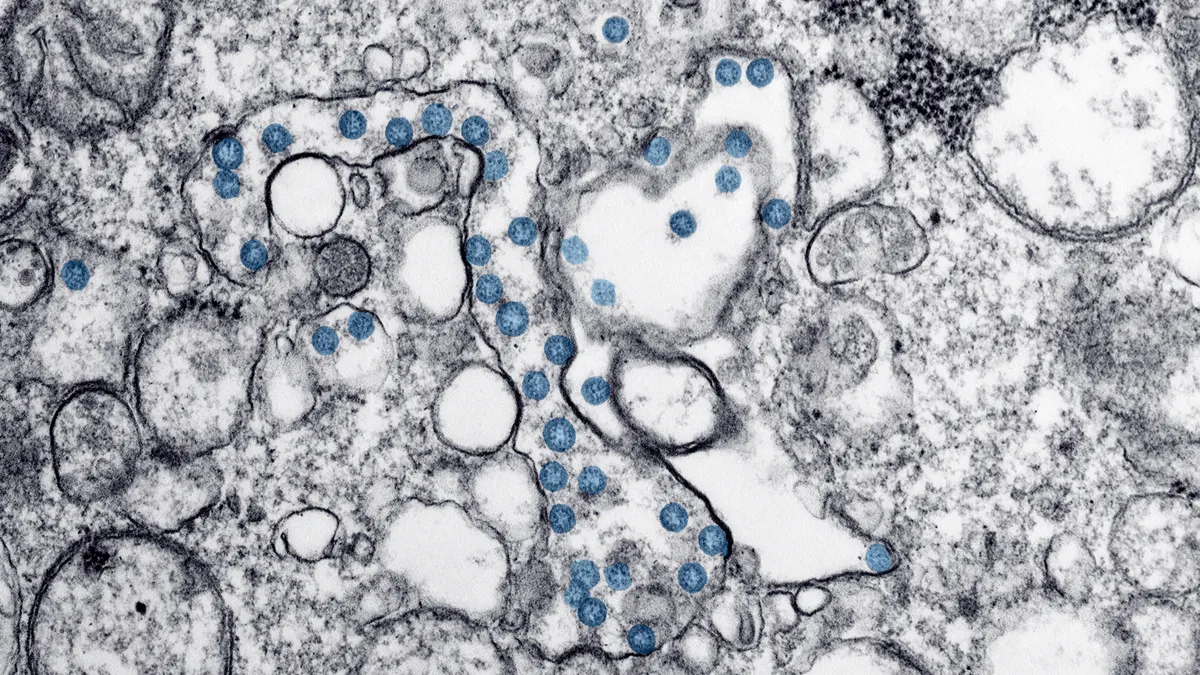Dive Brief:
- A Harvard-led panel of researchers made the case Monday that test makers must massively ramp up production of coronavirus testing if the U.S. is to safely reopen its economy. Some 5 million tests per day will be needed by early June to “deliver a safe social reopening,” and by late July that amount will need to grow to 20 million a day to fully remobilize the economy, the researchers said in a report.
- That's a far cry from the current U.S. testing capabilities and the White House's own assessment of how soon parts of the country can be reopened. Vice President Mike Pence said Friday that the U.S. has conducted a total of 3.7 million COVID-19 tests and "labs and hospitals are now performing more than 120,000 tests a day."
- President Donald Trump and Pence over the weekend insisted testing capabilities are "sufficient" to open parts of the country and blamed governors for not making full use of available tests. Governors say they cannot reopen unless the federal government can provide them with test kits and lab supplies which continue to be in short supply. Private and public labs also cite the supply bottlenecks.
Dive Insight:
The Harvard report, which calls for eventually scaling up capacity to test 2% to 6% of the U.S. population per day, comes as the administration and states continue finger pointing over testing. Researchers called for a Pandemic Testing Board to coordinate supply and delivery chains, similar to the WWII-era War Production Board created by President Franklin Delano Roosevelt.
"Almost every link in the testing architecture from the final mile in cities and states back through the laboratories that process tests, the machine manufacturers, the factories producing RNA reagents, etc. report almost an identical story," the report said.
"All fault the other links in the chain for either lacking the relevant supply or demand to scale up, and all argue that what they have heard from others is that further supply is impossible or further demand is not forthcoming."
The board would ostensibly include members from business, labor, academia, and government with authority to identify supply chain elements necessary for manufacturing, procuring, scaling, and deploying any items related to testing, as well as the power to procure materials and mandate production similar to authorities in the Defense Production Act.
"In aggregate, the country’s existing virus testing capacity (using PCR) would probably be sufficient to handle an order of magnitude more testing above the current test levels if it were better organized and coordinated with demand," according to researchers.
To restart the economy by August the nation needs major investments, particularly in diagnostic and antibody testing, with an estimated price tag of $15 billion per month over the next year, the report said. It comes as congressional leaders and the administration are reportedly nearing a deal that could send $25 billion to labs to help boost testing.
Pence on Sunday appeared on NBC’s Meet the Press and insisted “there is a sufficient capacity of testing across the country today for any state in America” to enter the first of three phases that the administration claims are needed for the country to reopen.
Nonetheless, New York Governor Andrew Cuomo on Friday said "the federal government cannot wipe their hands of this and say the states are responsible for testing," calling the current situation "mayhem."
The American Association for Clinical Chemistry on Friday issued a similarly dire statement in response to the White House plan for the reopening of the country, warning that labs face severe supply shortages to conduct COVID-19 tests, including swabs, viral transport media, reagents, pipettes and personal protective equipment.
That warning came a week after four associations representing the nation’s public health leaders urged the president to “utilize all existing authorities to require American corporations to expand or retool their production lines to urgently produce testing supplies and personal protective equipment.”
The groups called for “rapid manufacturing and production of supplies and equipment necessary for rapid point-of-care COVID-19 testing including reagents, point-of-care kits, viral transport media, laboratory supplies, and related products.”
While Trump has invoked the Defense Production Act to increase U.S. manufacturing of ventilators in response to the pandemic, he has not yet used the Korean War-era law to prod industry to address shortages in the lab testing supply chain. However, the president did say on Sunday he will use the DPA to increase the production of testing swabs to 20 million per month.
"Sample collection has been a choke point for increasing testing throughput in the United States, in part due to a shortage of swabs from the two manufacturers (Copan, Puritan)," according to the Harvard report. "There are only approximately 6 million per week nasal swabs being made now (1 million from Puritan and 5 million from Copan) and that needs to increase significantly to meet any testing goals."











